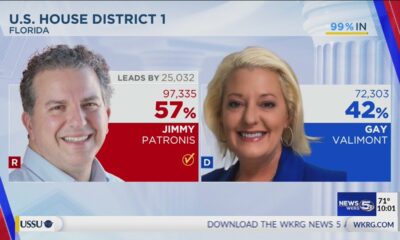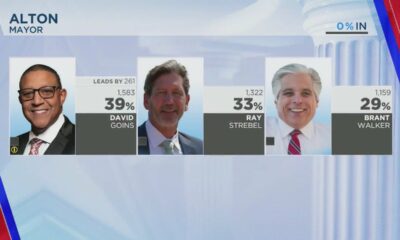georgiarecorder.com – Jacob Fischler – 2025-04-01 17:50:00
by Jacob Fischler, Georgia Recorder
April 1, 2025
A coalition of Democratic state officials sued the Trump administration Tuesday over plans to cut more than $11 billion in grants by the Department of Health and Human Services, on the same day thousands of HHS workers reportedly found they’d been swept up in a mass layoff.
In Washington, the Republican chairman and top Democrat on the Senate Health, Education, Labor and Pensions Committee wrote HHS Secretary Robert F. Kennedy Jr. asking him to appear before the panel and discuss his plans for the massive agency.
The federal suit, signed by 22 attorneys general and two Democratic governors, alleges Kennedy revoked, without warning, billions in grant funding appropriated by Congress during the COVID-19 pandemic, starting last week. That led to states scrambling to adjust plans for vaccination efforts, infectious disease prevention, mental health programs and more.
The sudden and chaotic rollout of the grant cuts foreshadowed a scene at HHS offices, including at big campuses in Maryland, on Tuesday morning. Termination notices to laid-off workers were reportedly emailed early Tuesday, but many workers did not see them before arriving at the office and finding out they’d lost their jobs when their key cards did not work.
Few specifics
Both the mass layoffs and the grant funding cuts challenged in the lawsuit stem from Kennedy’s March 27 announcement that the department would be “realigning,” by shuttering several offices and cutting 10,000 workers.
It was unclear Tuesday exactly what offices or employees were affected.
An HHS spokesperson responded to a request for comment by referring States Newsroom to Kennedy’s announcement, a press release and an accompanying fact sheet from March 27.
None provided a detailed breakdown but laid out plans to eliminate 3,500 full-time positions at the Food and Drug Administration, 2,400 employees at the Centers for Disease Control and Prevention, 1,200 staff at the National Institutes of Health and 300 workers at the Centers for Medicare and Medicaid Services.
The spokesperson did not respond to a follow-up inquiry requesting more details of the positions eliminated and other clarifications.
Efficiency doubted
In a written statement, Andrés Arguello, a policy fellow at Groundwork Collective, a think tank focused on economic equity, said the cuts would have “the exact opposite” effect of the administration’s stated goal of government efficiency.
“Gutting 10,000 public servants means higher costs, longer wait times, and fewer services for families already struggling with the rising cost of living,” Arguello, an HHS deputy secretary under former President Joe Biden, wrote. “Entire offices that support child care, energy assistance, and mental health treatment are being dismantled, leaving working families with fewer options and bigger bills. This isn’t streamlining—it’s abandonment, and the price will be paid by the sick, the vulnerable, and the poor.”
The lack of communication led to confusion among advocates and state and local health workers about the impacts of the staff cuts and cast doubt about the administration’s goals, speakers on a Tuesday press call said.
“There are so many more questions than answers right now,” Sharon Gilmartin, the executive director of Safe States Alliance, an anti-violence advocacy group, said. “They clearly are eliminating whole divisions and branches, which doesn’t speak to bureaucratic streamlining. It speaks to moving forward an agenda, which has not been elucidated for the public health community, it’s not been elucidated for the public.”
While specific consequences of the cuts were not yet known, Gilmartin and others said they would be felt at the state and local level.
“I think what we do know is that … when we’re cutting these positions at the federal level, we are cutting work in states and communities,” Gilmartin said.
Pain in the states
The lawsuit from Democratic officials is full of details about the impacts of the loss of federal funding on state programs.
The suit was brought in Rhode Island federal court by the attorneys general of Colorado, Rhode Island, California, Minnesota, Washington, Arizona, Connecticut, Delaware, the District of Columbia, Hawaii, Illinois, Maine, Maryland, Massachusetts, Michigan, Nevada, New Jersey, New Mexico, New York, North Carolina, Oregon and Wisconsin and Govs. Andy Beshear of Kentucky and Josh Shapiro of Pennsylvania.
HHS revoked “more than half a billion dollars” of grants from Pennsylvania, the Democratic officials said, affecting more than 150 state employees and contracted staff. The grants funded work “to respond to and mitigate the spread of infectious disease across the Commonwealth” and mental health and substance abuse programs.
In Nevada, “HHS abruptly terminated at least six grants” that had funded epidemiology and lab capacity, immunization access and mental health services, according to the suit.
“These terminations led Nevada to immediately terminate 48 state employees and to order contractors working under these awards to immediately cease all activity,” the complaint reads. “The loss of funding will have substantial impacts on public health in Nevada.”
The cutoff of $13 million in unobligated grants for local communities in Minnesota will mean the shuttering of clinics to provide vaccines for COVID-19, measles, mumps, rubella, influenza and other diseases, the suit said.
“One local public health agency reported that it held 21 childhood vaccination clinics and provided approximately 1,400 vaccinations to children in 2024,” a paragraph in the complaint about Minnesota local vaccine clinics said. “It also held 87 general vaccination clinics in 2024. As a result of the termination of the … funds, it has immediately ceased all vaccination clinics for 2025.”
The grant terminations also affected state plans already in the works.
Rhode Island had received an extension from HHS for a grant with $13 million unspent, but that money was revoked last week.
“Accordingly, the state public health department developed a workplan for its immunization program that included an April 2025 vaccination clinic for seniors, provided salaries for highly trained technicians to ensure that vaccine doses are stored and refrigerated correctly to prevent waste of vaccines purchased with other tax-payer dollars, planned computer system upgrades, and covered printing costs for communications about vaccine campaigns,” the suit said.
Senators want RFK Jr. on the Hill
Democrats on Capitol Hill issued a slew of statements opposing the cuts and warning of their effects.
Republicans were more deferential to the administration, asking for patience as details of the cuts are revealed.
But the letter from the top members of the Health, Education, Labor and Pensions Committee also brought both sides together to write Kennedy asking him to testify before the committee to make those explanations plain.
“The hearing will discuss your proposed reorganization of the Department of Health and Human Services,” the letter from Louisiana Republican Bill Cassidy and Vermont independent Bernie Sanders said.
In a written statement, Cassidy said the hearing would be an opportunity for Kennedy to inform the public about the reorganization.
“The news coverage on the HHS reorg is being set by anonymous sources and opponents are setting the perceptions,” Cassidy said in a written statement. “In the confirmation process, RFK committed to coming before the committee on a quarterly basis. This will be a good opportunity for him to set the record straight and speak to the goals, structure and benefits of the proposed reorganization.”
Last updated 6:40 p.m., Apr. 1, 2025
Georgia Recorder is part of States Newsroom, a nonprofit news network supported by grants and a coalition of donors as a 501c(3) public charity. Georgia Recorder maintains editorial independence. Contact Editor John McCosh for questions: info@georgiarecorder.com.
The post Dem states sue Trump administration over sudden cancellation of $11B in health funds appeared first on georgiarecorder.com








































